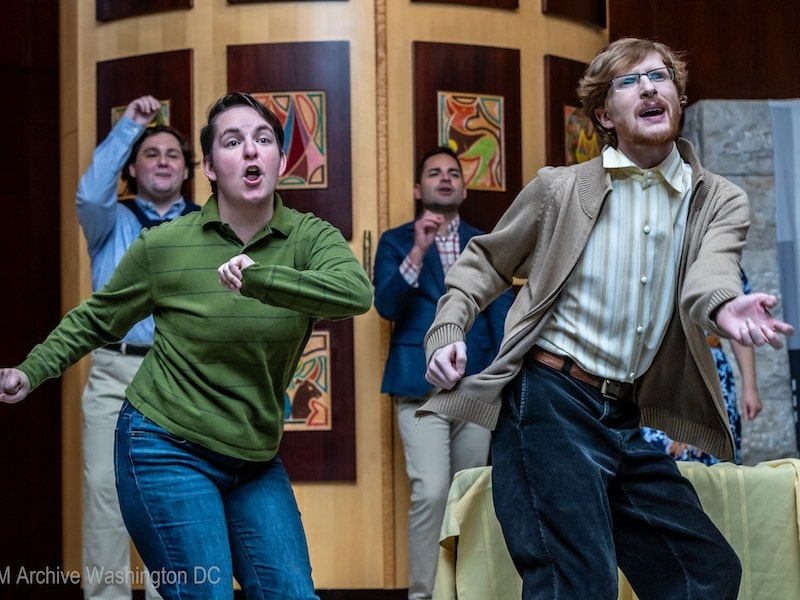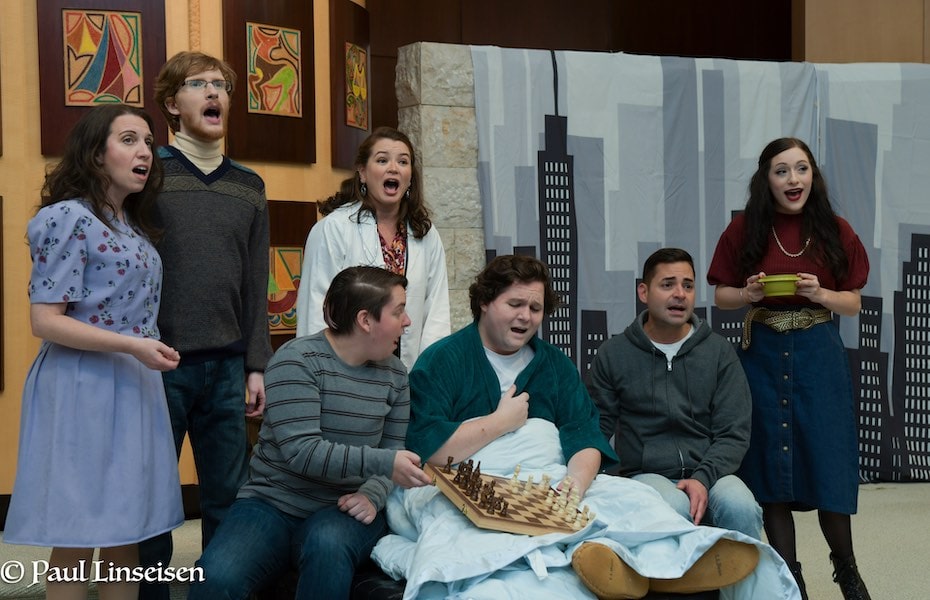Falsettos by William Finn (music and lyrics) and James Lapine (book) occupies the intersection of three well-populated Venn diagram circles from Broadway in the ’80s and ’90s: plays about Jews, plays about AIDS, and plays about white, well-to-do, whiny New Yorkers. It trumpets these subjects proudly — the opening number is called “Four Jews in a Room Bitching.”
That the book is by James Lapine (who won Best Book Tonys for Into the Woods and Passion, as well as for this) suggests that Falsettos aspires to Sondheim territory, featuring edgy portrayals of denizens of the Upper West Side, although Sondheim did not explicitly focus on either Jews or gays. Perhaps it was high time. It makes perfect sense to base a musical around three intersecting groups that are so central to the Broadway community.

The plot, opening in 1979, centers on Marvin, who leaves his wife and son for his gay lover Whizzer, but still expects them to accept Whizzer as part of their “tight-knit family,” singing, “I want it all.” Marvin then dumps his lover because, although they both find their constant bickering sexy, the thrill of first love is fading and Whizzer refuses to be monogamous and submissive. When Marvin’s ex-wife, Trina, who has had a patter-song breakdown because of his behavior, becomes engaged to their psychiatrist, Marvin turns on her in a jealous rage. This even gets its own song, in which “Marvin Hits Trina.” And then everyone wraps up the first act with a song called “I Never Wanted to Love You,” where they bemoan how they nevertheless do.
The question is, why? How could anyone love this selfish, narcissistic, nasty, neurotic antihero? Apparently, the answer is supposed to be because he loves his son, Jason, although he admits, “I never wanted to love you, I only wanted to see my face in yours.” There is perhaps freshness and even humor in such honesty, in such a warts-and-all depiction of a flawed man, and after all, Sondheim was able to make sympathetic characters out of murderers. But William Finn (who also composed The 25th Annual Putnam County Spelling Bee) is not quite Sondheim.
The second act picks up the story two years later. (The first act was originally a 1981 one-act musical by Finn called March of the Falsettos, and the second act came from another nine years later called Falsettoland. The difference between the two is that in the intervening years, the AIDS epidemic began to decimate the gay community.) A lesbian couple has moved in next door to Marvin, and they have all become fast friends. One is a doctor, and the other is a non-Jewish caterer who is trying to learn to cook Jewish food, a butt of repeated jokes. They have somehow all become one extended family, attending Jason’s sporting events (or, as they put it in the show’s funniest song, “watching Jewish boys who cannot play baseball play baseball”). Whizzer attends the baseball game at Jason’s invitation and succumbs to Marvin’s charming come-on line that he wants to run his hands through Whizzer’s receding hairline because it is his only physical imperfection.
The couples are for the most part content, while Jason is unhappy commuting between his parents’ homes while they bicker over his bar mitzvah, only uniting, comically, when he says he doesn’t want one, and his stepdad comforts him with a song about how “Everyone Hates His Parents.”

But of course, things can’t keep going cheerfully for long. Dr. Charlotte sings a foreboding song, “Something Bad is Happening,” about a new virus, and Whizzer immediately falls ill. All the friends try to reassure him that everything is going to be all right, until Jason comes in and tells him he looks terrible. But somehow, even on his deathbed, it seems to be Whizzer’s job to reassure Marvin. Jason decides to have his bar mitzvah in Whizzer’s hospital room, during which Whizzer dies a noble death. Marvin sings a poignant song about “What Would I Do?” if he had not met Whizzer and finally breaks down in the arms of his still-loving family.
Many people at the time the show came out were impressed by the complex portrayal of at least the protagonist, although all the other characters seem to exist only to serve him. The songs are frequently funny, sometimes startlingly so, although often Finn seems to pick lyrics because they rhyme and will evoke laughter or shock in the moment, not because they entirely make sense.
But the score is glorious.
The rhythms, the different styles, the harmonies — all are spectacular, and this is where the production at Theatre@CBT really shines. The seven actors’ voices blend beautifully on the complex chords and dance lightly over the complicated lyrics. These are all professional-quality singers.
They also make the most they can of the characters they are given.
Jessica Cooperstock brings life and warmth to Cordelia, the shiksa caterer “lesbian from next door, too,” essentially a one-joke character, who laments to her doctor lover, “You save lives, and I save chicken fat.” Chrissy Barnett Miller sparkles as the doctor, Charlotte, for whom a good day is when “nobody died” but who has to confront the coming plague before anyone else. They are both lovely in the quartet at the end for the two gay couples, “Unlikely Lovers.”
The always adorable Rob Milanic is perhaps too young for the role of the psychiatrist, Mendel, but he carries it well. He ricochets back and forth from the comedy of “Marvin at the Psychiatrist” and “Everyone Hates His Parents” to the frustrated confusion of questioning his career in “A Day in Falsettoland” to the somber tone of the finale.
Ryan Walker plays Marvin’s pretty boy lover, Whizzer, with an air of sweet humor that contrasts bitterly with the seriousness of his situation in songs like “The Games I Play” and “You Gotta Die Sometime.” It seems unfair that the show focuses on his lover when he is clearly the better man in the more tragic position, but even in death he fondly allows Marvin to take center stage.
Megan Hastie, who seems to be making a specialty of playing 12-year-old boys in community theaters in the area, is truly remarkable. Not only does she manage to play a male child, but she clearly shows his growth between Acts 1 and 2. Her Jason is not only a charming, funny boy, but seems, at many points, to be the only grown-up on the stage — in the best sense.
Lauren-Nicole Gabel has her work cut out for her as the only straight woman in the show, and she rises to the challenge. She has to deal, alone, with the expectations and entitlements of four men. She faces a maddening situation when her husband leaves her for a man but refuses to let her live her own life, and her solo, “I’m Breaking Down,” is a frenzied tour-de-force of frustration. In “Trina’s Song” she expresses frankly how she’s “tired of all the happy men who rule the world… they grow… but don’t mature,” but how she doesn’t really have a choice but to continue putting up with them. Later, her “Holding to the Ground” is a touching and bewildered ballad about how her life is nothing like she imagined it would be. Gabel’s lovely voice provides needed counterpoint, both moral and musical, to the male “falsetto” voices in the show.
And in the most difficult part, Rinaldo Martinez redeems Marvin without excusing his behavior. His voice and demeanor through most of the faster numbers have an edge, an almost nasal sharpness that seems all too appropriate to the character. But when he launches into his first solo, “Father to Son,” his voice becomes warm and rich, and as much affection for his son as he can manage glows forth. In Act 2, in his wondrous “What More Can I Say?” and “What Would I Do?” he manages, through his voice and acting, to conjure up a goodness in Marvin that it is hard to imagine he could ever possess.
The music director, Paul Rossen, makes the most of this treasure trove of voices, keeping the harmonies pure and the diction crisp, with the able assistance of the sound engineer, Matthew Datcher. His “teeny tiny band” as the script calls it, of piano, percussion, reeds, and synthesizer, supports the cast without overwhelming. Lisa Singleton’s charming choreography, with lots of scissor kicks and air guitar, adds to the humor of the production. Lauren Fielding and her costume team effectively make the transition from the ’70s to the ’80s.
And the director, Michael Abendshein, keeps all of this flowing smoothly by stripping it down to its basics. The sanctuary at Congregation B’nai Tzedek has no lighting equipment or scenic capability. Abendshein manages to tell the story with only a set of black upholstered cubes that are shifted around to suggest everything from living room furniture to offices to hospital beds. A few surprising touches round this out, such as the aircraft signaling wands in the Act 2 opening, and the evocation of a racquetball match by having the players strike the floor with racquets to make the sound of a shot. Perhaps more important, Abendshein emphasizes some implications that are missing in the script, such as having Trina follow the men around with a laundry basket during “Four Jews in a Room Bitching” saying her line “Slavery, slavery” (originally a reference to the Jews in Egypt) while collecting their discarded clothes, and then defiantly insisting that she is one of five Jews. It is one of the few acknowledgments that while it is the four male Jews who are in a room bitching, in this story, it is the woman who really has the right to bitch.
Falsettos is a beautiful and funny and heart-wrenching score about a very unpleasant man and the people who inexplicably love him. It is played to the utmost in the simplicity of the synagogue sanctuary, lending it even more meaning. And the voices that present it lift it to the sublime. It is a bracing and moving experience.
Running Time: Two hours with a 15-minute intermission.
Falsettos plays December 16, 2023, at 8 pm and December 17 at 2 pm presented by Theatre@CBT performing at Congregation B’nai Tzedek, 10621 South Glen Road, Potomac, MD. Tickets ($18) are available online.




